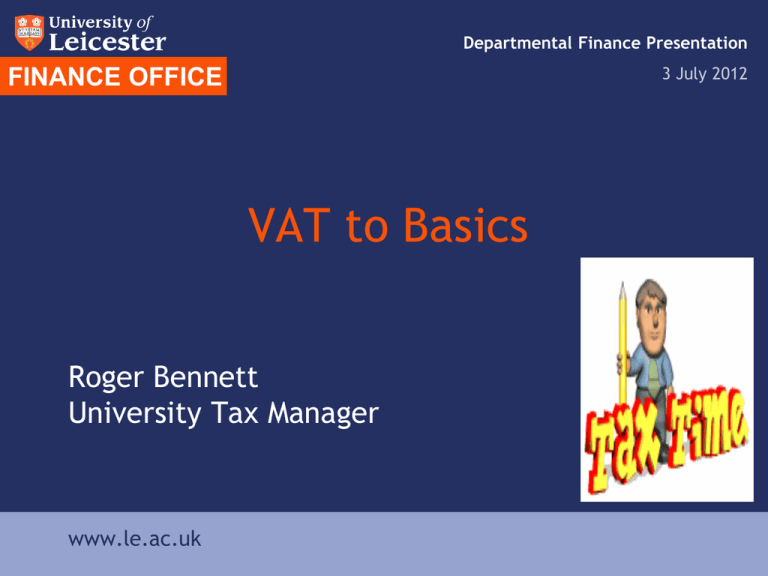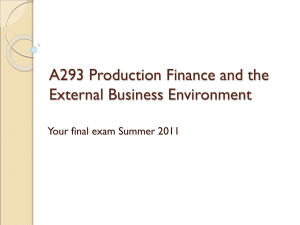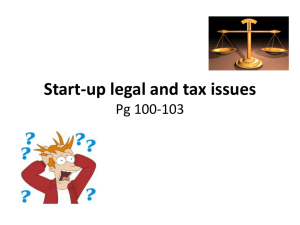VAT to Basics
advertisement

Departmental Finance Presentation 3 July 2012 FINANCE OFFICE VAT to Basics Roger Bennett University Tax Manager www.le.ac.uk www.le.ac.uk VAT – the Basics • VAT - tax on goods/services final consumption of • Two fundamental rules for VAT to arise – Supply of goods or services is made in return for a consideration – Made by a VAT registered person • UK Rates (taxable) – 20% standard rate – 5% reduced rate – 0% zero rate Rates of Tax • Standard Rate - 20% – Majority of goods and services – Increased to 20% on 4th Jan 2011 • Reduced Rate - 5% – Domestic fuel and power – Children's car seats • Zero Rate – Select group of goods and services • Some food (Groceries) • Books and newspapers • Children’s clothing • Public transport • Some equipment for the disabled • Certain purchases made by a charity UoL Zero Ratings • Zero rating on some goods and services, as a charity – Advertising - suppliers may ask for a certificate to declare our charitable status: contact the Tax Office if required – Goods and services for medical or veterinary research, training, diagnosis or treatment VAT Exempt • Some goods and services are exempt as it is considered inappropriate to tax them – Health – Education – Financial Services Outside the Scope of VAT • Donations – Given freely without the expectation of receiving anything in return • We buy or sell anything outside the EU – Special, complicated, rules apply – Depends on the place of supply – Foreign invoices always passed by Accounts Payable to the Tax Office – If unsure of VAT code contact the Tax Office Using VAT Codes • All purchase and sales invoices in the University require a VAT code • Sales invoices – VAT code depends on the nature of what you are selling • Purchase invoices – VAT code depends on the rate we have been charged and we can also recover the VAT A Quick Guide Income VAT code Expenditure VAT code Outside the Scope Y6 T3 VATable Supply YS T2 Zero Rate Supply Y3 T2 Exempt Supply Y1 T3 Y4 (Goods) Y5 (Services) T2 EU Export EU Import Mixed Use Purchase T4 (Fully recoverable) T5 (non recoverable) PT (part recoverable) PS Output Tax (Income) • VAT we charge on sales made to our customers BUT – We do not charge VAT on all sales as not all sales are taxable • We collect this VAT and pay it to HMRC as part of the quarterly VAT return Types of University Income • VAT code is determined by the nature of what we are charging for – Raising a sales invoice/received cash for…… • Education (exempt Y1) • Consultancy (standard rate YS) (taxable) • Donation (outside scope Y6) • Sale of Books (zero rate Y3) (taxable) • Research for a commercial sponsor (standard rate YS) (taxable) • Grant funding received from a not for profit organisation(Y6) ‘Education’ (Exempt) • Tuition fees • Short courses and workshops • Academic conferences • Hire of rooms to external organisations • Medical diagnosis and treatment Input Tax (Expenditure) • VAT charged to us on purchase invoices we pay this to our suppliers • The supplier invoice should clearly identify if VAT has been charged – clues to look for on the invoice – Supplier VAT number – Rate of VAT – Amount of VAT being charged, i.e. net, VAT and gross Purchase Invoices • Recovery status of VAT – Input VAT (VAT on purchase invoices) can be fully recoverable, partly recoverable or nonrecoverable – Recovery status depends on what the purchase has been used for What are we using the Purchases for (UK suppliers)? • Purchases used to make a taxable supply, recovery status is fully recoverable – Taxable Purpose: any supply where we charge a positive rate of VAT to our customers, eg Commercial research contracts (inc KTP projects) Consultancy contracts Testing and analytical services Hire of staff Catering – bar sales VAT code is T2 • Purchases used to make a non-taxable supply, recovery status is non-recoverable – Non-Taxable: any supply which is either exempt or outside the scope of VAT, eg Teaching and short courses Educational conferences Non-commercial research (charity/government funded) VAT code is T3 • Purchases used to make a mixed supply, recovery status is partly recoverable – Mixed Supply: purchases to be used for Taxable and Non Taxable supplies, eg Purchase of equipment that will be used for commercial research (taxable) and teaching (exempt) General overheads, eg purchase of office equipment VAT code is PS Medical Zero Rating • The following equipment (and related parts/ accessories) qualify for zero rating if to be used by an eligible body mainly for medical or veterinary research, training, diagnosis or treatment – medical - scientific – computer (and certain software) – sterilising – refrigeration • Full details on - video - laboratory HMRC website (http://www.hmrc.gov.uk/charities/vat/charity-funded.htm) or contact the Tax Office Purchases from Non-UK Suppliers • Other VAT codes exist for purchases from overseas suppliers (see handout) • Where VAT has not been charged on invoice by overseas supplier, may need to apply reverse charge VAT (we apply VAT on the supply ourselves) – Automatic in SAP by using correct VAT code • The University must account for VAT at the rate the supply would attract if supplied in the UK, eg consultancy, financial advice, supply of staff, electronic services Question Time! • We do not charge VAT on tuition fees, educational conferences, and hire of rooms. – What VAT code do we use to raise the sales invoice? • We have supplied consultancy and are charging the standard rate (20%) VAT. – What VAT code do we use to raise the sales invoice? • We are supplying books. Books are zero rated therefore we are not charging VAT. – What VAT code do we use to raise the sales invoice? Need Assistance or Advice? • Taxation Section – Room 172, FJB – Roger Bennett (University Tax Manager) ext 2475 rb209@le.ac.uk – Raj Bhola (Assistant Tax Accountant) ext 2379 rh109@le.ac.uk – Jos Puri (Direct Tax Accountant) ext 5182 jp238@le.ac.uk • University Tax Office Website – http://www.le.ac.uk/finance/infoforms/vat/taxhome.html • HMRC website helpful for detailed VAT rules - use search or look under ‘charities’ or ‘education’ section – http://www.hmrc.gov.uk/



